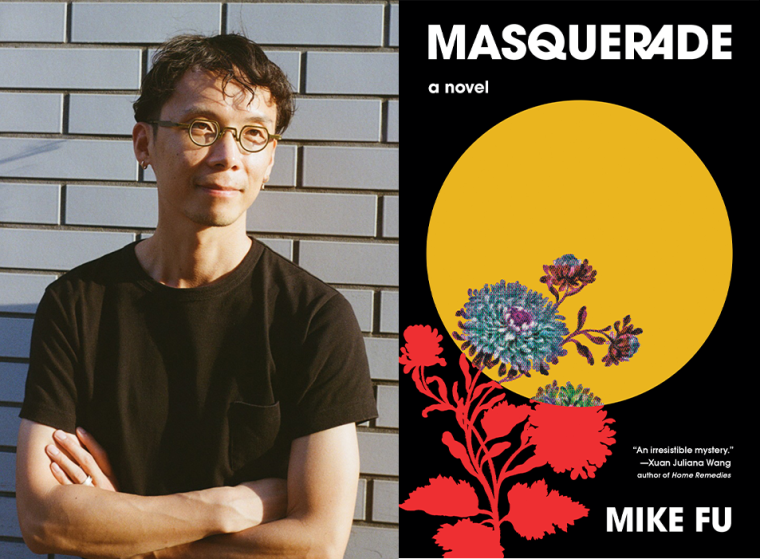This week’s installment of Ten Questions features Mike Fu, whose debut novel, Masquerade, is out today from Tin House. The novel follows Meadow Liu, who is newly single and house-sitting for his friend, the artist Selma Shimizu, when he stumbles upon The Masquerade, a novel about a masked ball in 1930s Shanghai. The author’s name is the same as Meadow’s own in Chinese—Liu Tian. Over the course of one summer, Meadow notices several bizarre things: a possibly haunted apartment, an unreliable mirror, a stranger speaking in riddles at the bar where he works, as well as a startling revelation about a former lover. When Selma disappears from her artist residency, Meadow is forced to question the precarious boundary between reality and imagination. Time magazine called Masquerade a “surreal, queer, coming-of-age mystery set between New York and Shanghai” and the Chicago Review of Books praised the debut for doing “an excellent job at putting readers on their back foot, making for a surreal journey into the strangeness and beauty of youth.” Mike Fu is a writer, translator, and editor based in Japan. His Chinese-English translation of Stories of the Sahara (Bloomsbury, 2020) by the late Taiwanese cultural icon Sanmao was named a Favorite Book of the Year by the Paris Review and shortlisted for the National Translation Award in Prose. He is a cofounder and former translation editor of the Shanghai Literary Review and received his PhD in cultural studies from Waseda University in 2024. Fu is an affiliate faculty member in the MFA program in creative writing at Antioch University in Los Angeles and a lecturer in Asian Studies at Temple University, Japan Campus.

Mike Fu, author of Masquerade. (Credit: Carina Fushimi)
1. How long did it take you to write Masquerade?
It took just over a year to get a full draft done, not counting a few false starts and an earlier iteration of the novel that I had to scrap after about a hundred pages. Self-editing lasted another half year. Then my agent Heather Carr and I went through four more drafts over ten months before going out on submission.
2. What was the most challenging thing about writing the book?
Initially, the most challenging part for me was maintaining the stamina to complete a project of such length—a marathon, not a sprint, and all that jazz. Then it became fortitude in the face of the excruciating querying process. As an unagented author of a debut work, you really have to either delude yourself into insane confidence or trust in divine providence to keep fighting that fight. So many books never see the light of day, and this was a harsh reality I had to face and be prepared to accept at various parts of the journey.
3. Where, when, and how often do you write?
I write best if I can make it part of my routine, with the productive tension that a busy schedule creates. I haven’t been so persistent as of late due to a whole bunch of professional commitments that have mushroomed on me, but I hope to carve out more time in the near future. Setting aside even just an hour or two daily will get me to where I need to be, so long as I can maintain this pace over a period of time.
4. What are you reading right now?
Rejection (William Morrow, 2024) by Tony Tulathimutte and I Sing the Body Electric! (Knopf, 1969) by Ray Bradbury are in my reading pile this month, along with some classic manga by Osamu Tezuka.
5. Which author, in your opinion, deserves wider recognition?
I know she’s far from underappreciated among certain circles, but reading M. F. K. Fisher for the first time was a revelation. Such zest and warmth in her depiction of ordinary meals and everyday scenes.
6. What is the biggest impediment to your writing life?
Deprioritization. I just started a new full-time job in an adjacent industry. Between these demands on my time and freelance work that I’ve committed to as a translator and editor, my own fiction necessarily falls to a lower rung on the ladder. I do hope to incrementally stake out more space for it over the years.
7. What is one thing that your agent or editor told you during the process of publishing this book that stuck with you?
The whole journey has been so illuminating, edifying, and ultimately empowering that it would be impossible to melt it down to a single moment. Through my experience with this novel, I’ve come to deeply appreciate the roles of both agent and editor—the wonderfully insightful duo of Heather Carr and Elizabeth DeMeo, in my case—as literary partners in the truest sense. It’s such a deeply personal thing, to share work that is nowhere near as polished as the version that goes to print, and to receive such sensitive and insightful feedback in return. I’m forever grateful!
8. If you could go back in time and talk to the earlier you, before you started Masquerade, what would you say?
Streamline. Outline. Find your center of gravity.
9. Outside of writing, what other forms of work were essential to the creation of Masquerade?
Many of the book’s core images and atmospheres were formed through my encounters with cinema. Music from a wide range of genres and eras was influential in my thinking about the mood of certain scenes or characters. My passing interest in contemporary art manifests in the novel too.
10. What’s the best piece of writing advice you’ve ever heard?
Having the courage to start over from scratch is something I internalized from Maaza Mengiste, my MFA advisor, back when she was sharing her experience of writing what would become The Shadow King (Norton, 2019), her Booker Prize–shortlisted second novel. Another thing I learned from Maaza was the imperative to push your narrative into or toward spaces that you might instinctively shrink away from.







